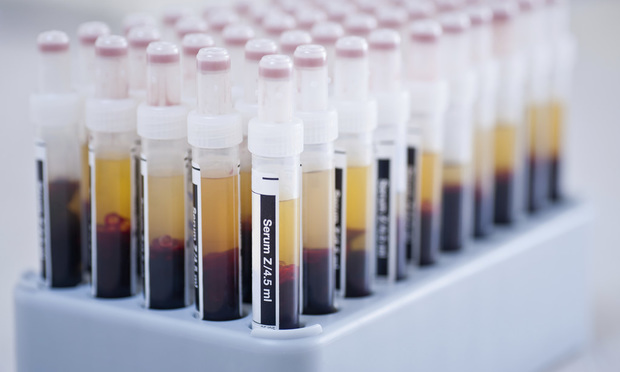Split Supreme Court Approves Warrantless Blood Draw in DWI Case
The majority ruled in "State v. Zalcberg,"a 5-2 decision on Tuesday, that a lack of training for police about the need for and availability of telephonic warrants—in the context of a serious road accident and a changing landscape for such warrants at the time—could form an exigency that renders the warrantless blood sampling compliant with the Fourth Amendment.
March 28, 2018 at 05:34 PM
6 minute read

A drunken driving suspect's constitutional rights were not violated by a blood draw where police officers believed no warrant was needed and were unaware that warrants could be obtained by telephone, a divided Supreme Court ruled.
The majority ruled on Tuesday in State v. Zalcberg, 5-2 decision, that a lack of training for police about telephonic warrants—in the context of a serious road accident and a changing landscape for such warrants at the time—could form an exigency that renders the warrantless blood sampling compliant with the Fourth Amendment.
The two dissenting justices said the officers' ignorance of the law does not justify the violation of a defendant's constitutional rights.
The court reversed an order below suppressing evidence from the blood test.
The case concerned a 2011 crash in Freehold Township in which a vehicle containing Shayna Zalcberg and two passengers struck another car. A passenger in Zalcberg's car, Feliciano Colon, was killed. Police had probable cause to suspect Zalcberg was driving drunk when paramedics reported that she smelled of alcohol and a small liquor bottle was found on her car's console, according to the court's decision.
There were some case law complexities, and a prior trip up the appellate ladder, leading up to Tuesday's ruling.
The judge who granted a defense motion to suppress evidence of the blood draw was guided by the U.S. Supreme Court's 2013 decision in Missouri v. McNeely, which said that dissipation of alcohol from a defendant's blood does not constitute a per se exigency justifying a warrantless blood draw. The motion to suppress came four months after the Supreme Court decided McNeely.
But in 2015, the Appellate Division ruled in State v. Adkins that McNeely should be applied only prospectively. Based on the Appellate Division ruling in Adkins, another appellate panel in Zalcberg reversed the order granting the defense motion to suppress.
Then, also in 2015, the Supreme Court took up Adkins and ruled that McNeely was subject to pipeline retroactivity. In light of that, the Supreme Court, having also taken up Zalcberg, reversed the Appellate Division's ruling and remanded for a new suppression hearing.
On remand, the trial court again granted Zalcberg's motion to suppress. The Appellate Division affirmed that ruling, and the state appealed.
Before the Supreme Court, the prosecution argued that the courts below had failed to evaluate the totality of the circumstances in evaluating exigency. The state said it was vital to consider that the responding police officers, before reopening the road to traffic, had to investigate a major accident in which victims were recovered using the “Jaws of Life” and taken away by helicopter; had to interview witnesses; and collect evidence from the scene.
The state also argued that, because of those factors, telephonic warrants were effectively unavailable to officers on the night in question. Although the court rules permitted warrants to be granted by phone, the state asserted that no workable statewide procedure existed at the time of the crash.
Justice Faustino Fernandez-Vina—joined by Chief Justice Stuart Rabner, and Justices Jaynee LaVecchia, Anne Patterson and Lee Solomon—said the defendant's reliance on the “technical existence” of telephone warrants was “unavailing” and ”ignores both the impracticality of the warrant system in place at the time of the accident and the police officers' genuine pre-McNeely belief that a warrant was not compulsory.”
“Defendant contends that the officers could reasonably have learned of the availability of telephonic warrants by consulting a legal authority. But that begs the question—why would the officers seek out legal advice if they had an earnest belief that warrants were not required for blood draws? We conclude that the officers' lack of awareness of any formal procedure through which they could obtain a telephonic warrant, coupled with their pre-McNeely belief that they did not need such a warrant, suggests there was no reasonable availability of a warrant,” Fernandez-Vina wrote for the majority.
The justices also rejected the defendant's assertion that reversing the trial court's suppression creates a “bright-line accident exception” to the warrant requirement for blood draws in suspected DWI cases. “Not every automobile accident produces a set of circumstances sufficient to constitute exigency,” the court said.
Justices Barry Albin and Walter Timpone, in their dissent, criticized the majority's reliance on the officers' lack of awareness.
“The majority's finding that a warrantless blood draw was permitted in this case, which involved no true exigency, effectively renders McNeely a nullity and undoubtedly will be cited to justify further end-runs around the warrant requirement,” they wrote.
The appellate lawyer for Zalcberg, Patricia Quelch of Helmer, Conley & Kasselman in Freehold, called the ruling “troubling” for its recognition of police ignorance of procedure.
“This is creating a de facto good-faith exception. Law enforcement is now going to reap the benefit of this particular ruling if they've made a mistake in procedure,” Quelch said.
Handling the case for the Monmouth County Prosecutor's Office was Assistant Prosecutor Monica do Outeiro.
The office in a statement said the decision ”allows us to proceed with our prosecution in this fatal motor vehicle collision and use the best evidence of defendant's guilt, blood tests demonstrating that the defendant had a BAC over the legal limit.”
The office added: “Following the fatal collision here, a system to obtain telephonic warrants was implemented statewide, with the assistance of the judiciary. Since implementation of this system in 2013, the Monmouth County jury and law enforcement have received training as to this process. The Supreme Court decision does recognize, however, that there are cases—like Zalcberg—that present sufficient objective exigency permitting a blood sample be taken without a warrant. The practice of the Monmouth County Prosecutor's Office since 2013 has and will continue to be to obtain a telephone warrant where [practicable] under the circumstances.”
Cherry Hill lawyer Jeffrey Gold, who defends drunken driving cases but is not involved in Zalcberg, likewise called the decision troubling. “The Supreme Court has veered dangerously toward accepting a form of good-faith exception to a warrant requirement. They have previously and rather assiduously stayed away from accepting any form of good faith,” Gold said.
However, Gold saw one good point for defense lawyers in the court's ruling—its holding that an accident alone, in combination with the inherent dissipation of alcohol, was not enough to create an exigency. That holding would be helpful to the defense bar, he said.
This content has been archived. It is available through our partners, LexisNexis® and Bloomberg Law.
To view this content, please continue to their sites.
Not a Lexis Subscriber?
Subscribe Now
Not a Bloomberg Law Subscriber?
Subscribe Now
NOT FOR REPRINT
© 2025 ALM Global, LLC, All Rights Reserved. Request academic re-use from www.copyright.com. All other uses, submit a request to [email protected]. For more information visit Asset & Logo Licensing.
You Might Like
View All
Appellate Division Tosses Challenge to Rutgers Board Members That Ensnared NJ Lawyer
5 minute read
On the Move and After Hours: Einhorn Barbarito; Hartmann Doherty; Lowenstein Sandler; Lindabury McCormick
5 minute read

'A More Nuanced Issue': NJ Supreme Court Considers Appellate Rules for Personal Injury Judgments
5 minute readTrending Stories
- 1Reviewing Judge Merchan's Unconditional Discharge
- 2With New Civil Jury Selection Rule, Litigants Should Carefully Weigh Waiver Risks
- 3Young Lawyers Become Old(er) Lawyers
- 4Caught In the In Between: A Legal Roadmap for the Sandwich Generation
- 5Top 10 Developments, Lessons, and Reminders of 2024
Who Got The Work
J. Brugh Lower of Gibbons has entered an appearance for industrial equipment supplier Devco Corporation in a pending trademark infringement lawsuit. The suit, accusing the defendant of selling knock-off Graco products, was filed Dec. 18 in New Jersey District Court by Rivkin Radler on behalf of Graco Inc. and Graco Minnesota. The case, assigned to U.S. District Judge Zahid N. Quraishi, is 3:24-cv-11294, Graco Inc. et al v. Devco Corporation.
Who Got The Work
Rebecca Maller-Stein and Kent A. Yalowitz of Arnold & Porter Kaye Scholer have entered their appearances for Hanaco Venture Capital and its executives, Lior Prosor and David Frankel, in a pending securities lawsuit. The action, filed on Dec. 24 in New York Southern District Court by Zell, Aron & Co. on behalf of Goldeneye Advisors, accuses the defendants of negligently and fraudulently managing the plaintiff's $1 million investment. The case, assigned to U.S. District Judge Vernon S. Broderick, is 1:24-cv-09918, Goldeneye Advisors, LLC v. Hanaco Venture Capital, Ltd. et al.
Who Got The Work
Attorneys from A&O Shearman has stepped in as defense counsel for Toronto-Dominion Bank and other defendants in a pending securities class action. The suit, filed Dec. 11 in New York Southern District Court by Bleichmar Fonti & Auld, accuses the defendants of concealing the bank's 'pervasive' deficiencies in regards to its compliance with the Bank Secrecy Act and the quality of its anti-money laundering controls. The case, assigned to U.S. District Judge Arun Subramanian, is 1:24-cv-09445, Gonzalez v. The Toronto-Dominion Bank et al.
Who Got The Work
Crown Castle International, a Pennsylvania company providing shared communications infrastructure, has turned to Luke D. Wolf of Gordon Rees Scully Mansukhani to fend off a pending breach-of-contract lawsuit. The court action, filed Nov. 25 in Michigan Eastern District Court by Hooper Hathaway PC on behalf of The Town Residences LLC, accuses Crown Castle of failing to transfer approximately $30,000 in utility payments from T-Mobile in breach of a roof-top lease and assignment agreement. The case, assigned to U.S. District Judge Susan K. Declercq, is 2:24-cv-13131, The Town Residences LLC v. T-Mobile US, Inc. et al.
Who Got The Work
Wilfred P. Coronato and Daniel M. Schwartz of McCarter & English have stepped in as defense counsel to Electrolux Home Products Inc. in a pending product liability lawsuit. The court action, filed Nov. 26 in New York Eastern District Court by Poulos Lopiccolo PC and Nagel Rice LLP on behalf of David Stern, alleges that the defendant's refrigerators’ drawers and shelving repeatedly break and fall apart within months after purchase. The case, assigned to U.S. District Judge Joan M. Azrack, is 2:24-cv-08204, Stern v. Electrolux Home Products, Inc.
Featured Firms
Law Offices of Gary Martin Hays & Associates, P.C.
(470) 294-1674
Law Offices of Mark E. Salomone
(857) 444-6468
Smith & Hassler
(713) 739-1250






